




Tea stains on your carpet can be a real eyesore, especially if you don’t know how to remove them properly. These stains can be stubborn and if not treated immediately, they may become permanent. But fear not, because we have some easy and effective methods to help you get rid of those pesky tea stains and restore your carpet to its former glory.
Vinegar and Baking Soda: One of the simplest and most effective ways to remove tea stains from your carpet is by using vinegar and baking soda. Mix equal parts of white vinegar and water, and pour the solution onto the stained area. Let it sit for a few minutes, then sprinkle baking soda over the vinegar solution. Gently scrub the stain with a cloth or a soft-bristle brush, and then rinse with clean water. Repeat the process if necessary.
Lemon Juice: Another natural remedy you can try is lemon juice. Squeeze fresh lemon juice onto the stained area and let it sit for a few minutes. Lemon has natural bleaching properties and can help lighten the stain. After a few minutes, blot the stain with a clean cloth soaked in cold water. Repeat if necessary.
Commercial Carpet Stain Removers: If the previous methods don’t work or if you prefer a ready-made solution, there are several commercial carpet stain removers available in the market. Look for a product specifically designed to remove tea stains and follow the instructions on the label. Make sure to test the product on a small, inconspicuous area of the carpet first to check for any adverse reactions.
Note: It’s important to treat tea stains as soon as possible to prevent them from setting into the carpet fibers. Blot the stain gently with a clean cloth or paper towel to remove any excess liquid before applying any cleaning solution.
With these easy and effective methods, you can say goodbye to tea stains on your carpet. Remember to always test any cleaning solution on a small, hidden area of the carpet first to avoid any damage. With a little patience and the right technique, your carpet will be stain-free in no time!
Easily Remove Tea Stains from your Carpet
Introduction
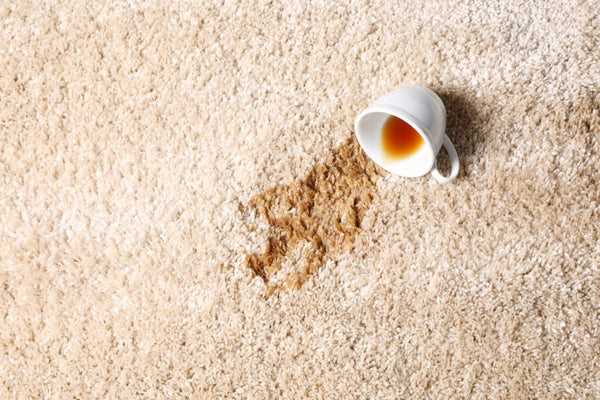
Tea stains are a common problem when it comes to carpets. Whether it’s a spilled cup of tea or a teabag that has burst open, the resulting stain can be stubborn and difficult to remove. Luckily, there are several easy and effective ways to remove tea stains from your carpet. In this article, we will discuss some of these methods.
Method 1: Blotting
The first step in removing tea stains from your carpet is to immediately blot the area with a clean cloth or paper towel. This will help absorb as much of the tea as possible before it has a chance to set into the carpet fibers. Be sure to blot gently to avoid spreading the stain further.
Method 2: Vinegar Solution
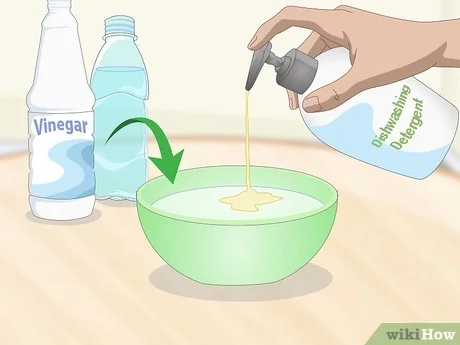
If blotting alone is not enough to remove the tea stain, you can try using a vinegar solution. Mix together equal parts white vinegar and water and pour the solution onto the stained area. Let it sit for a few minutes, then blot the area again with a clean cloth to lift the stain. Rinse the area with water and blot dry.
Method 3: Baking Soda Paste
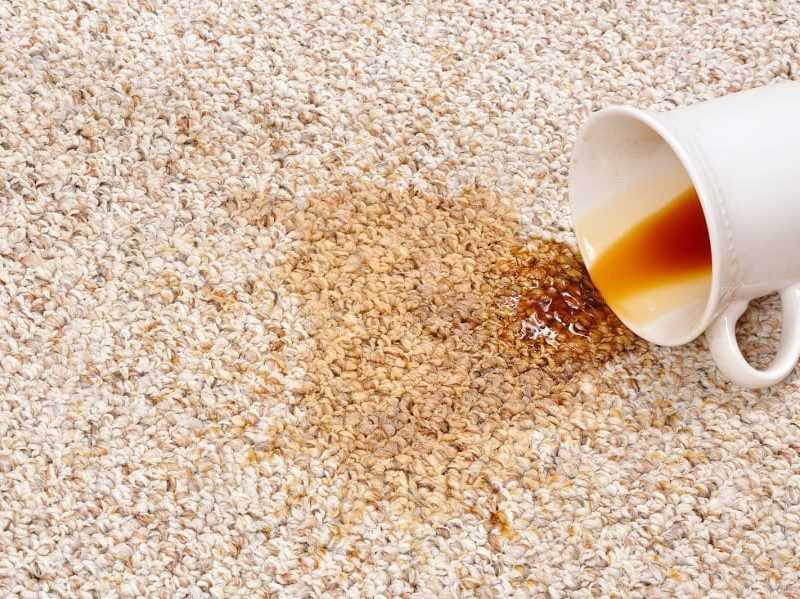
Another effective method for removing tea stains from your carpet is to create a baking soda paste. Mix baking soda with enough water to form a thick paste. Apply the paste to the stained area and let it sit for at least 30 minutes. Once the paste has dried, vacuum up the residue and rinse the area with water. Blot dry with a clean cloth.
Method 4: Commercial Stain Removers

If the tea stain is particularly stubborn, you may want to consider using a commercial stain remover specifically designed for carpets. Follow the instructions on the product label and be sure to test it on a small, inconspicuous area of your carpet first to ensure that it does not cause any damage.
Conclusion
Tea stains on your carpet can be unsightly, but with the right methods, they can be easily removed. Remember to blot the stain immediately, try using a vinegar solution or baking soda paste, and consider using a commercial stain remover if needed. By following these easy and effective methods, you can keep your carpet looking clean and stain-free.
Use Dish Soap and Warm Water
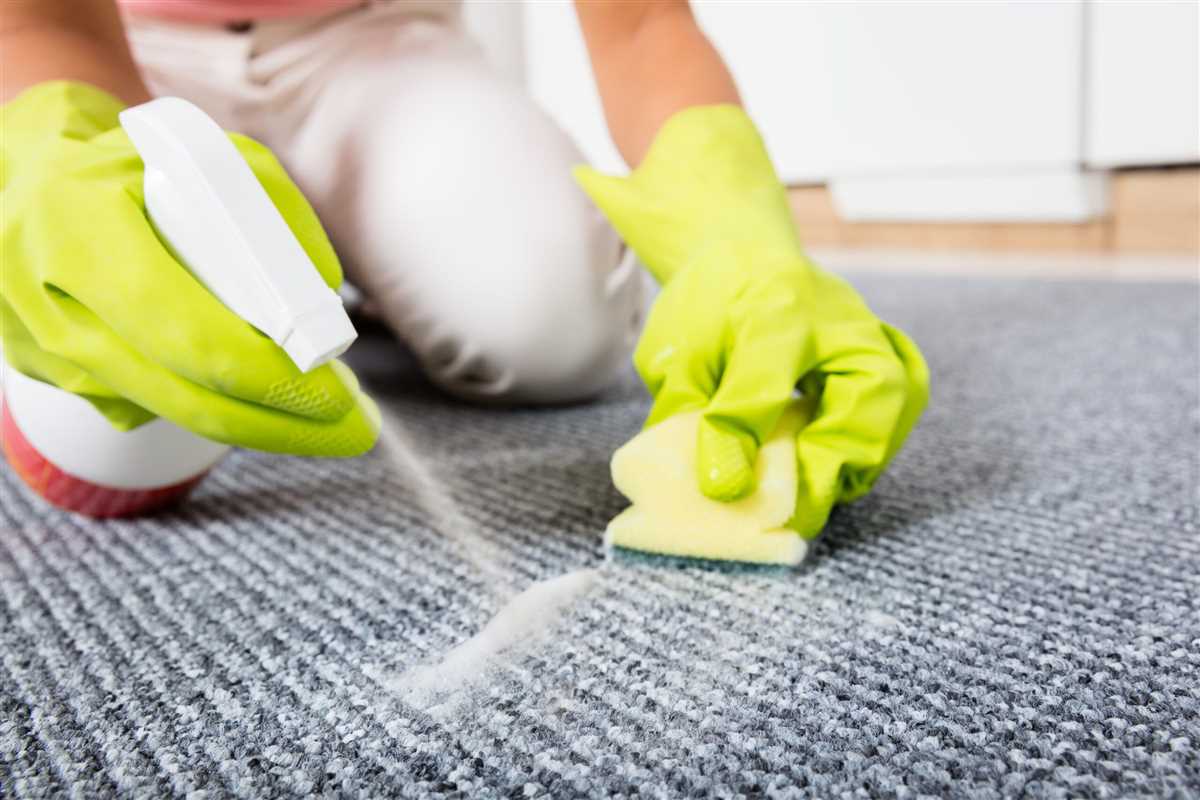
One of the easiest and most effective ways to remove tea stains from your carpet is by using dish soap and warm water. This method is convenient because dish soap is a common household item that many people already have in their kitchens. Here’s how you can use dish soap and warm water to remove tea stains from your carpet:
- Start by blotting the area with a clean cloth or paper towel to remove any excess tea.
- Mix a few drops of dish soap with warm water in a small bowl or bucket. Be sure to use a mild dish soap that does not contain any harsh chemicals.
- Dip a clean sponge or cloth into the soapy water and gently dab the stained area. Avoid scrubbing aggressively, as this can push the stain deeper into the carpet fibers.
- Continue dabbing the stain with the soapy water until it begins to fade. If necessary, you can also gently rub the stain in a circular motion.
- Once the stain is no longer visible, rinse the area with clean water to remove any soap residue.
- Use a dry cloth or paper towel to blot the area and remove any excess moisture. You can also place a weighted object, such as a book, on top of the cloth to help absorb the moisture.
It’s important to act quickly when treating tea stains to prevent them from setting into the carpet. By using dish soap and warm water, you can effectively remove tea stains and restore the appearance of your carpet. Remember to always test any cleaning solution in an inconspicuous area of the carpet before applying it to the stained area.
Try Vinegar and Baking Soda Mixture
If you’re looking for a natural and effective way to remove tea stains from your carpet, consider using a vinegar and baking soda mixture. Both vinegar and baking soda have powerful cleaning properties that can help lift and remove stains.
Here’s how you can use this mixture:
- Start by blotting the tea stain with a clean cloth or paper towel to remove any excess liquid.
- Mix equal parts white vinegar and water in a spray bottle. The amount you’ll need will depend on the size of the stain.
- Spray the vinegar and water mixture directly onto the tea stain.
- Allow the mixture to sit on the stain for about 5-10 minutes.
- In the meantime, sprinkle baking soda over the stained area. Make sure to cover the entire stain.
- Using a soft brush or sponge, gently scrub the baking soda into the carpet fibers. This will help the mixture penetrate the stain and lift it out.
- After scrubbing, let the mixture sit on the stain for an additional 10 minutes.
- Finally, vacuum up the baking soda residue and blot the area with a clean cloth or paper towel to remove any remaining moisture.
This vinegar and baking soda mixture can be quite effective in removing tea stains from your carpet. However, it’s important to test the mixture on a small, inconspicuous area of your carpet first to ensure that it doesn’t cause any damage. If there are no adverse effects, you can proceed with treating the tea stain.
Remember to always blot rather than rub the stain to prevent it from spreading. Additionally, act quickly to remove the stain as soon as possible for the best results.
Apply Lemon Juice and Salt Solution
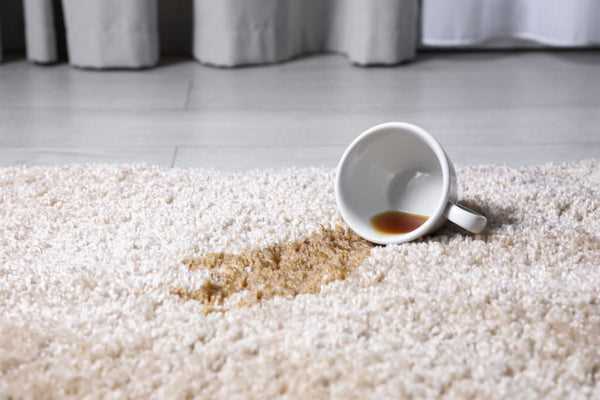
To remove tea stains from your carpet, you can create a simple and effective solution using lemon juice and salt.
- Mix equal parts lemon juice and salt in a bowl to create a paste.
- Apply the paste directly onto the tea stain, covering it completely.
- Gently rub the mixture into the stain using a clean cloth or sponge. Be careful not to scrub too hard, as it may damage the carpet fibers.
- Let the solution sit on the stain for about 5-10 minutes to allow it to penetrate and lift the stain.
- After the designated time, blot the area with a clean cloth or paper towel. You should start to see the tea stain transferring onto the cloth.
- If the stain persists, repeat the process until it is completely removed.
- Once the stain is gone, rinse the area with clean water to remove any residue from the lemon juice.
- Blot the area again with a dry cloth or paper towel to remove excess moisture.
This method works because lemon juice has natural bleaching properties, while salt acts as a mild abrasive to help lift the stain. It is important to act quickly when treating tea stains to prevent them from setting into the carpet fibers.
Before using any cleaning solution, it is recommended to test it on a small, inconspicuous area of your carpet to ensure it does not cause any discoloration or damage. If you are unsure or have a delicate carpet, it is best to consult a professional carpet cleaner.
Utilize Commercial Carpet Stain Removers
1. Research and Choose a Reliable Commercial Carpet Stain Remover
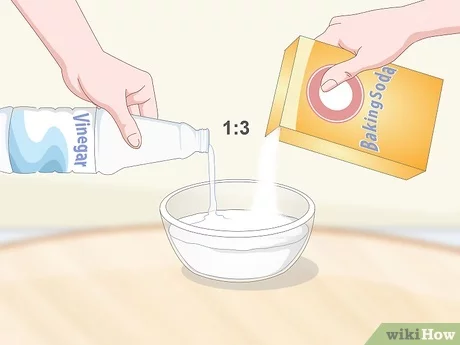
When it comes to tea stains on your carpet, commercial carpet stain removers can be a convenient and effective solution. There are many options available in the market, so it’s important to do some research and choose a reliable product that suits your needs.
Look for carpet stain removers that specifically mention tea stains in their product description or labels. These products are typically formulated to target the tannins in tea, which are responsible for the stain.
2. Read and Follow the Instructions
Once you’ve purchased a commercial carpet stain remover, it’s crucial to read and follow the instructions provided by the manufacturer. Different products may have different application methods or wait times, so it’s important to use the product correctly for best results.
Pay attention to any safety precautions mentioned in the instructions, such as wearing gloves or ensuring proper ventilation in the area where you will be applying the stain remover.
3. Test on a Small, Inconspicuous Area
Before applying the commercial carpet stain remover to the entire tea stain, it’s recommended to test the product on a small, inconspicuous area of your carpet. This will help you determine if the product is compatible with your carpet and if there are any adverse reactions.
Apply a small amount of the stain remover to the test area and follow the instructions for removing the stain. Wait for the area to dry and check for any discoloration or damage. If there are no negative effects, you can proceed to treat the tea stain on the rest of your carpet.
4. Apply the Stain Remover to the Tea Stain
Once you’ve tested the product and are confident in its compatibility with your carpet, it’s time to apply the stain remover to the tea stain. Follow the instructions provided by the manufacturer, which may include spraying the product directly on the stain or using a cloth or sponge to apply it.
Make sure to saturate the entire tea stain with the stain remover, ensuring that it penetrates the fibers of the carpet. Allow the product to sit on the stain for the recommended amount of time specified in the instructions.
5. Blot and Rinse the Area
After the stain remover has had time to work on the tea stain, use a clean cloth or paper towel to blot the area and remove the excess moisture. Press firmly, but avoid rubbing, as this can spread the stain or damage the carpet fibers.
Once you’ve blotted the area, rinse the spot with clean water to remove any residue from the stain remover. Blot the area again to remove the water, and repeat the rinsing process if necessary.
6. Allow the Carpet to Dry

After treating the tea stain with a commercial carpet stain remover, it’s important to allow the carpet to dry completely. This will help prevent any remaining moisture from attracting dirt or causing mold or mildew to develop.
Open windows or turn on fans to promote airflow and aid in the drying process. Avoid walking on the treated area until it’s fully dry to prevent any re-soiling or damage to the carpet.
7. Evaluate the Results
Once the carpet is dry, evaluate the results of the stain removal process. Depending on the severity of the tea stain and the effectiveness of the stain remover, the stain may be completely removed or significantly reduced.
If the stain persists, you may need to repeat the process or consider using a different stain remover or professional carpet cleaning service to fully remove the tea stain.
Remember, prevention is always better than cure. It’s essential to address tea spills immediately and blot them up as much as possible with a clean cloth or paper towel before they have a chance to set in. Regular carpet maintenance and prompt stain removal can help keep your carpet looking clean and fresh for years to come.
Opt for Professional Carpet Cleaning
If you have tried all the DIY methods and still can’t get rid of those stubborn tea stains on your carpet, it may be time to call in the professionals. Professional carpet cleaning services have the equipment, expertise, and specialized cleaning solutions to effectively remove even the toughest of stains.
Here are a few reasons why you should consider opting for professional carpet cleaning:
- Deep Cleaning: Professional carpet cleaners use powerful equipment that can penetrate deep into the carpet fibers, ensuring a thorough cleaning.
- Effective Stain Removal: Professional cleaners have access to a range of specialized cleaning solutions that are designed to tackle specific types of stains, including tea stains. They know which solution to use and how to apply it to achieve the best results.
- Time-Saving: Cleaning a tea stain from a carpet can be a time-consuming task. By hiring professionals, you can save yourself the time and effort of scrubbing and cleaning, allowing you to focus on other tasks.
- Prevention of Damage: Incorrect cleaning methods or using harsh chemicals can actually damage your carpet fibers. Professional cleaners are trained to handle different types of carpets and use techniques that are safe and gentle on your carpet.
- Long-Term Savings: Regular professional carpet cleaning can help extend the lifespan of your carpet by removing dirt, debris, and stains that can deteriorate the fibers over time. This can save you money in the long run by reducing the frequency of carpet replacement.
When choosing a professional carpet cleaning service, make sure to do your research and read reviews to ensure you are hiring a reputable and experienced company. Additionally, ask about their methods, equipment, and cleaning solutions to make sure they align with your needs and requirements.
Overall, opting for professional carpet cleaning can be a great solution to remove tea stains from your carpet effectively and efficiently. Their expertise and specialized equipment can make a significant difference in the appearance and cleanliness of your carpet.
FAQ
What are some easy methods to remove tea stains from carpets?
There are several easy methods to remove tea stains from carpets. One method is to mix a solution of white vinegar and water, and then blot the stain with a clean cloth soaked in the solution. Another method is to sprinkle baking soda on the stain, let it sit for a few minutes, and then vacuum it up. Additionally, you can try using a carpet cleaner specifically designed to remove stains.
How do I remove an old tea stain from my carpet?
If you have an old tea stain on your carpet, there are a few steps you can take to remove it. First, mix a solution of dishwashing soap and warm water. Then, use a clean cloth to blot the stain with the soapy solution. Next, rinse the area with clean water and blot it dry. If the stain persists, you can try using a carpet cleaner or contacting a professional carpet cleaning service.
Can I use bleach to remove tea stains from my carpet?
No, you should not use bleach to remove tea stains from your carpet. Bleach can cause the carpet to fade or discolor, and it may also weaken the carpet fibers. It is best to use alternative methods, such as vinegar or baking soda, to remove tea stains.
What should I do if I accidentally spill tea on my carpet?
If you accidentally spill tea on your carpet, you should act quickly to prevent the stain from setting. First, blot the stain with a clean cloth or paper towel to remove as much liquid as possible. Then, mix a solution of mild dish soap and warm water, and blot the stain with the solution. Rinse the area with clean water and blot it dry. If the stain persists, you can try using a carpet cleaner or contacting a professional carpet cleaning service.












